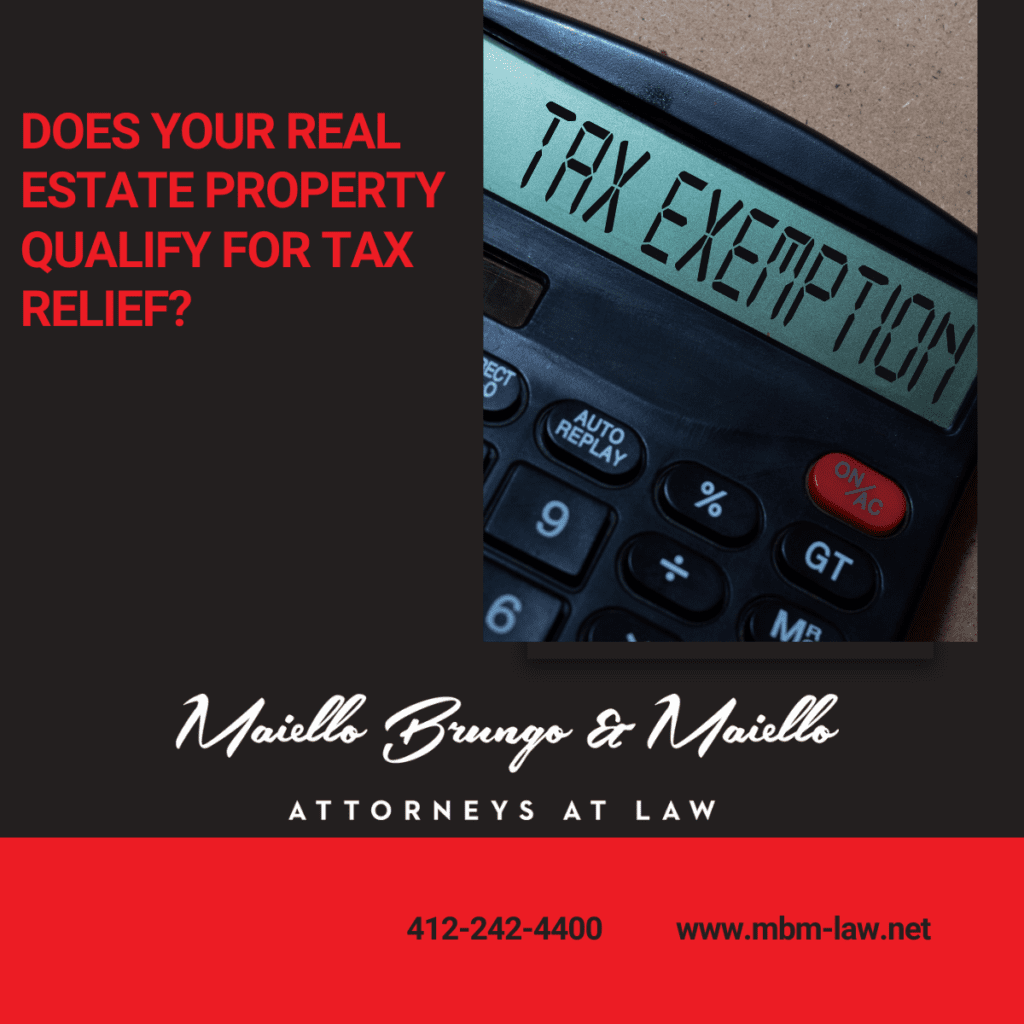In Pennsylvania, the status of real property is determined as of the date an assessment is levied and taxes are due. Even though as of January 1st of each year all real estate receives an assessment based on the property’s fair market value, it is also the case that these same properties may be eligible for tax-exempt status which reduces or eliminates a property owner’s tax burden. Both the owner and the use of the property must qualify as exempt.
The tax assessment legal team of MBM Law has experienced tax-exemption attorneys. Contact our real estate law team, which is recognized by 2024’s Best Lawyers®, to guide you through your Allegheny County tax-exemption process.
Get Tax Assessment Legal Advice
Filing for Tax Exempt Status in Allegheny County
Filing for tax exempt status in Allegheny County is a simple process. Here are the steps you need to take to complete the process to get tax exemption status for your real estate in Allegheny County, PA.
- Download and fill out this Application for Exemption of Real Estate Taxation form.
- Application deadline is on or before March 31 of each year.
- The application is directed to the Office of Property Assessment (OPA), with copies of the application and supporting documentation to the County, municipality and school district.
- The application requires basic information about the property, including how the property is being used; whether it is used as a residence and the date the purported exempt purpose began.
- OPA also asks for documentation regarding any rental of the property; documents indicating a non-profit use of the property; and a sketch of the property.
- The Allegheny County tax exemption application and documentation are reviewed by OPA and a letter of determination is issued either granting or denying the exemption.
- If the owner or any taxing body is dissatisfied with the determination, an appeal can be taken and a hearing held by OPA and a further appeal can be taken to the County of Allegheny Court of Common Pleas. Evidence and testimony can be presented by both sides although the owner always has the burden of proving it is entitled to the exemption.
If you are a resident of Allegheny County and need assistance filing for your real estate’s tax exempt status, or if you require legal advice on appealing your tax exemption status, please contact MBM Law today.
5 Key Requirements for Tax-Exempt Status in Allegheny County
Certain properties easily obtain exempt status such as, but not limited to: (1) a place of religious worship; (2) non-profit burial grounds; (3) property owned by public entities and used for a public purpose; (4) institutions of learning; (5) public libraries; and (6) museums.
The Pennsylvania HUP Test
Potentially more difficult is to qualify as a “purely public charity.” An owner must satisfy the requirements set forth by the Pennsylvania Supreme Court in what is referred to as the HUP test as well as the requirements set forth pursuant to Act 55 (10 P.S. § 375(b)-(f).) The five elements of the HUP test are as follows:
- Advances a charitable purpose;
- Donates or renders gratuitously a substantial portion of its services;
- Benefits a substantial and indefinite class of persons who are legitimate objects of charity;
- Relieves government of some of its burden; and
- Operates entirely free from private profit motive.
Act 55 Summary
The burden of proving each of these five elements is on the owner who is requesting the tax exemption in Allegheny County. If the owner fails to meet this burden, then it is not entitled to exempt status. However, if the owner proves all five elements, then it must meet the standards set forth in Act 55 which are:
- Advances a charitable purpose;
- Donates or renders gratuitously a substantial portion of its services;
- Benefits a substantial and indefinite class of persons who are legitimate objects of charity;
- Relieves government of some of its burden; and
- Operates entirely free from private profit motive.
Act 55 maintains the same five-factor structure as the HUP test; however, it sets forth several different requirements in the form of quantitative tests requiring mathematical calculations and accounting principles.
Beyond HUP Test Approval
Review of the HUP test and Act 55 factors in relation to a property is exceptionally fact specific. While case law can and does provide guidance with respect to each of the elements, an owner must partake in a comprehensive analysis of the institution, its corporate structure, its business practices and its charitable endeavors when applying for exemption.
Qualification for HUP Exempt Status
Assuming an owner is able to qualify for exempt status, a review of the property itself must be undertaken as an exemption is limited to “only that portion of real property…which is actually and regularly used for [charitable] purposes,” according to the Constitution of Pennsylvania. Vacant buildings or vacant land, for example, are not generally entitled to tax exemption. A portion of a building leased to a for-profit entity is also not entitled to exemption. In these particular situations, OPA will determine a percentage of the property being used for a non-charitable purpose and deem that portion as taxable with the remaining percentage remaining exempt. Owners must pay attention to how they or their tenants use the property to ensure that the exemption remains in effect.
HUP Challenges and HUP Appeals
Owners must be aware that even if granted exempt status, a taxing body has the right to appeal and challenge that exemption. Applications must be filed by March 31st in order to be considered in that calendar year. The same process as outlined above is adhered to following a submission of a challenge. If there are concerns regarding the exemption or in order to forgo the time and cost of litigation, the parties at times enter into payment in lieu of taxes agreements (PILOT). A PILOT usually calls for the payment of some amount of tax to one or all of the taxing bodies for the promise not to object to the owner’s exempt status. Given the complexity of proving an exemption for a purely public charity, many large entities in Allegheny County enter into PILOT agreements with local taxing authorities.
Legal Consultation with an Allegheny Tax Assessment Lawyer
While the Allegheny tax assessment application itself is simple, owners must approach the process as a whole carefully and cautiously. It is suggested an experienced real estate attorney be consulted if the matter goes beyond the first stage and the entity must prove those elements of the HUP test and Act 55.
Whether you are seeking exempt status or recognition as a charity, MBM’s Real Estate lawyers guide you through the process to meet the standards and burden required. Our Real Estate law team is recognized in the 2024 U.S. edition of Best Lawyers. Please contact us before the March 31 deadline.


